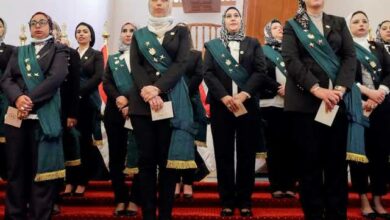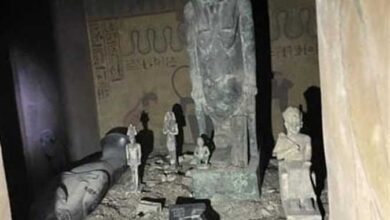Elections to the People’s Assembly, Egypt’s lower house of parliament, slated for 29 November will be conducted without an independent judicial body monitoring the process. To analysts, this raises expectations of fraud.
In 2007, when the government amended Article 88 of the Constitution, which regulates judicial supervision of the elections, it precluded any possibility of fairness and transparency in the election process, experts say. The amendment also decided parliamentary elections would be held on just one day, replacing the three-day precedent.
Nasser Amin, lawyer and general director of the Arab Center for Independence of the Judiciary and Legal Profession, says the 2000 and 2005 parliamentary elections shed light on the 2007 the constitutional change.
“In 2000 the country experienced its first ever free elections, as the constitutional court had decided that each ballot box had to be supervised by a judge,” he said.
The 2005 election constituted a major breakthrough toward a more transparent and democratic electoral process, until the government realized that the Muslim Brotherhood posed a real threat.
“The first of the three phases of this election was free and transparent, and the Brothers won 88 seats in this first phase. The government immediately felt the danger and sabotaged phase two and three of the elections,” he says.
Judge Ahmed Mekki explains that “in the 2005 parliamentary elections, the government assigned a judge for every ballot box and the election had to unfold on more than a single day so that judges could move from one polling station to another. “
In the aftermath of the 2005 parliamentary elections, judges took in massive numbers to the street, demonstrating against what they considered blatant fraud. “This unrest of the judicial body convinced the government that independent judges were dangerous, and as a result the government decided it should stop any kind of supervising and monitoring for the next elections, which led us to the 2007 constitutional change,” Amin says.
“For the upcoming elections, there are no independent judges monitoring the process, so it can all be wrapped up in a day,” says Mekky.
“With the 2010 parliamentary elections, we are going back to the electoral system that prevailed before 2000. This is a monumental step backwards,” Amin says.
The 1995 parliamentary elections are widely viewed as having been the country’s most violent and fraudulent poll. That election delivered only 14 of the 444 seats to opposition candidates.
In 2000, the Supreme Constitutional Court ruled the 1995 electoral procedures unconstitutional. It called for judges’ supervision in all balloting locations as well as a three-stage process to allow judicial monitors to observe voting everywhere. But opposition members regard the 11-member official electoral monitoring committee, composed of judges and non-partisan public figures and formed as a result of the ruling, with no more than cynicism.
The National Democratic Party-aligned daily Rose al-Youssef on 8 September reported the committee is capable of observing the electoral process. It added that the Article 88 amendment is intended to improve the efficiency of the electoral process. The committee will coordinate with at least 2000 judges in the monitoring process, according to the report.
At a conference on Saturday, leftist Tagammu Party leader Refaat al-Saeed said the committee resembles a secret organization. “Where is the headquarters of this committee? What phone number does it have, or email address?” he questioned.
Independent civil society monitoring is no less of a challenge during the upcoming elections. Hafez Abu Saada, the president of the Egyptian Organization for Human Rights (EOHR), explains that “roughly 3000 volunteers from human rights organizations will be present all over Egypt’s polling stations on that day to observe and report major fraud.”
In order for the observers to be fully aware of their rights while engaged with activity surrounding the elections, EOHR has been providing them with legal information.
But the government, according to those NGOs, have counter plans.
Amin says the government has an effective plan to suppress NGO voices denouncing the electoral process. “Since 2005, the government has created 20 to 30 NGOs that are actually governmental organizations which will rise as one unified voice to assure that these elections are free and democratic…How can our voices be heard in this context?”
Abu Saada says his NGO has sided with 130 organizations in various governorates and with five human rights groups to create an “Egyptian Coalition for Observing the Elections.” But the NGO members complain that, with very few exceptions, they cannot attend the counting of votes.
“We have a list of demands to the government for the next fall elections. Our observers must be allowed in the counting room, we need to use phosphoric ink that marks the finger for several days, and we need signatures and the names of the voters as well as international watchdogs,” Abu Saada says.
Abu Saada also denounces the ongoing use of manual listings of voters, while each and every Egyptian has a personal national ID number that is computerized. “The use of this computerized list would be much more effective to prevent people from voting more than once,” he says.
Both Abu Saada and Amin insist that the upcoming parliamentary election results are a foregone conclusion and that the ruling National Democratic Party has already met with major opposition parties and independent candidates to grant each a certain number of seats in the next lower house–a move that would establish legitimacy in the process.
“Here is what the government is planning for the next elections,” Amin says. “First, it will make sure that no more than 20 seats go to the Muslim Brotherhood. Second, the government is conscious that it needs more variety in political groups and parties within the parliament. So it will distribute the 100 seats that it won’t keep for the NDP between the Wafd, Tagammu and Nasserist Parties as well as independents, keeping 344 seats for members of the dominant party.”
Abu Saada is even less optimistic for the Brotherhood than Amin, predicting than no more than eight seats will be granted to them. He added that back-door deals are already on-going between security officials and the Brotherhood leaders, to determine their presence in the upcoming elections.
To date, opposition leaders have called for more substantive guarantees for free and fair elections. Participation, for many opposition members, is contingent on those guarantees. As a result, many are opting to boycott.




